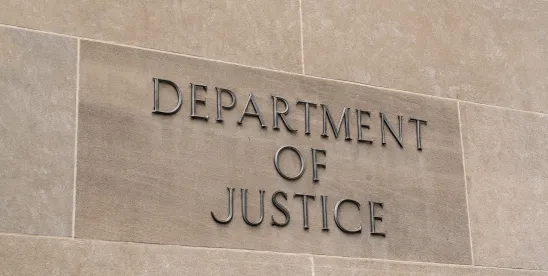Key Takeaways
- DOJ Criminal Division will prioritize enforcement in key areas, including health care fraud, trade and customs violations and national security-related financial crimes.
- Companies that voluntarily self-disclose, cooperate and remediate may qualify for declinations, reduced penalties and shortened compliance obligations even where aggravating factors are present.
- Corporate compliance agreements will generally be capped at three years, with early termination available based on remediation, risk reduction and program maturity.
- Independent compliance monitors will be imposed only when necessary and must be narrowly tailored to limit burden and business disruption.
On May 12, 2025, the Head of the Department of Justice’s (DOJ) Criminal Division, Matthew R. Galeotti, issued a memorandum detailing the Division’s enforcement priorities and policies for prosecuting corporate and white-collar crimes under the Trump administration.
The memorandum describes the need for the Division’s policies to “strike an appropriate balance” between investigating and prosecuting criminal wrongdoing "while minimizing unnecessary burdens on American enterprise.” In accordance with this position, the memorandum describes areas that the Division will be particularly focused on investigating and prosecuting, while also emphasizing the Division’s willingness to reduce criminal and civil sanctions when corporations self-disclose and cooperate with the government.
Overall, the memorandum describes enforcement priorities and associated policies that align with the Trump administration’s focus on rooting out government waste and abuse, toughening U.S. policy on foreign trade and combatting national security concerns such as drug trafficking and foreign crime organizations, citing to several executive orders on these topics.
The Criminal Division’s “Areas of Focus” include:
- Federal program fraud, waste and abuse—specifically health care fraud and procurement fraud;
- Trade and customs fraud, including tariff evasion;
- Fraud perpetrated through variable interest entities (VIEs), including schemes targeting elders, “ramp and dumps,” and other forms of market manipulation;
- Fraud that victimizes U.S. investors, individuals and markets, such as Ponzi schemes, schemes targeting elders and servicemembers and fraud that threatens consumer health and safety;
- Financial institutions that commit sanctions violations or enable transactions by Transnational Criminal Organizations (TCOs), drug cartels, hostile nation-states and/or foreign terrorist organizations;
- Corporations that provide “material support” to foreign terrorist organizations, cartels and TCOs;
- Complex money laundering schemes—specifically referencing “Chinese Money Laundering Organizations” and other organizations involved in laundering money used in the manufacturing of illegal drugs;
- Violations of the Controlled Substances Act and the Federal Food, Drug, and Cosmetic Act, including the unlawful manufacture and distribution of products used to create counterfeit pills containing fentanyl and the unlawful distribution of opioids by medical professionals and companies;
- Bribery that impacts U.S. national interests, undermines U.S. national security and harms the competitiveness of the U.S.; and
- Crimes involving the use of digital assets—with cases impacting victims, involving cartels, TCOs, or terrorist groups or facilitating drug money laundering or sanctions evasion receiving the highest priority.
After outlining the Criminal Division’s investigation and prosecution priorities, the memorandum indicates that the Department will take a more relaxed approach to misconduct committed by corporations that are willing to report such conduct, cooperate with the government and take actions to remediate the misconduct. In fact, these are factors that Criminal Division prosecutors must now consider when determining whether to bring criminal charges against corporations.
The memorandum further states that the Division’s Corporate Enforcement and Voluntary Self-Disclosure Policy will be revised to clarify additional benefits that are available to companies that self-disclose and cooperate with the government and will provide a “more easily understandable” path for declination and fine reductions. As part of this effort, the Criminal Division’s Fraud Section and Money Laundering and Asset Recovery Section have been instructed to review all existing corporate compliance agreements to determine if they should be terminated early. Facts that these Sections may consider when determining whether early termination is warranted include the duration of the post-resolution period, a substantial reduction in the company’s risk profile, the extent of remediation and maturity of the compliance program and whether the company self-reported the misconduct.
Additionally, Division attorneys must consider several factors when imposing terms for corporate compliance agreements, including the severity of the misconduct, the company’s degree of cooperation and remediation and the effectiveness of the company’s compliance program at the time of resolution. The memorandum provides that the terms of such agreements should not exceed three years “except in exceedingly rare cases,” and Division attorneys should assess these agreements regularly to determine if they should be terminated early.
Lastly, the memorandum provides policy changes with respect to the use of independent compliance monitors. Namely, the Division will only impose such monitoring when necessary, for example, when a company cannot be expected to implement an effective compliance program or prevent recurrence of the underlying misconduct, and the monitoring must be narrowly tailored to minimize expense, burden and interference with business.
Mr. Galeotti discussed these policy changes while speaking at the Securities Industry and Financial Markets Association’s Anti-Money Laundering and Financial Crimes Conference on May 13, 2025, stating that companies will now have a “clear path to declination” through self-disclosure, full cooperation with the government and timely remediation. Galeotti stated that even companies with aggravating circumstances may receive declination if the company’s cooperation and remediation outweigh these circumstances. Furthermore, Galeotti indicated that even companies that self-disclose after the government has become aware of their misconduct can still qualify for shorter-term compliance agreements, fine reduction and lessened monitoring.
Taken together, this memorandum and other guidance issued by DOJ under the direction of U.S. Attorney General Pam Bondi, indicate that the Department intends to treat corporate misconduct outside certain areas of focus with a lighter hand, incentivizing corporations to be transparent with the government and, as stated in the Division’s memorandum, “learn from their mistakes.”





 />i
/>i
